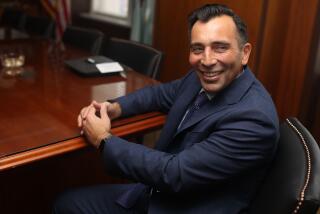Barry Minkow is sentenced to five years in prison
- Share via
Barry Minkow is headed back to prison to serve a five-year sentence for securities fraud, but the ex-con who reinvented himself as a San Diego minister and crime fighter was looking on the bright side of his situation.
In his plea bargain to a single count of conspiracy, Minkow admitted that his falsehood-filled attacks on Lennar Corp. had caused the home builder to lose $583 million in stock market value. Because that amount was so huge, he might have been sentenced to 30 years or more had he gone to trial and been convicted instead of pleading guilty.
“Considering I deserved life without [parole], today could not have gone better,” Minkow said in an email to The Times from Miami, where U.S. District Judge Patricia A. Seitz imposed the maximum five-year sentence Thursday on the conspiracy charge.
Seitz gave Minkow 60 days to report to the work camp where he will serve his sentence, and Minkow said he believed the judge tried to understand his situation.
“The U.S. marshal walked me out of the courtroom and said: ‘That lady cares about you,’” Minkow said.
In material he prepared for his sentencing, Minkow said he had become addicted to painkillers as a result of having severe migraine headaches, and had been dependent on the strong and addictive drug Oxycontin before finally kicking the habit when he realized he was under criminal investigation.
He had asked to be placed in a special prison program for treating drug addiction, a request that the judge granted, he said. She also assigned him to a work camp in Montgomery, Ala., near his home in Tennessee.
“So all in all, it went very well,” Minkow said.
Minkow burst onto the national stage in the 1980s as the head of ZZZZ Best, a carpet and furniture cleaning company he started as a teenager in his parents’ garage in Reseda. He was widely hailed as a young genius until it was revealed that ZZZZ Best was built on credit-card fraud and fabricated work orders.
Minkow, who testified that mobsters had infiltrated his company, was convicted in 1988 of 57 fraud counts. He spent more than seven years in prison for defrauding investors, but after his release he reinvented himself as the chief minister at Community Bible Church in San Diego and head of his own Fraud Discovery Institute on the side.
In his latter role, he became closely watched by stock traders, especially short sellers, the speculative investors who place bets on declining stock prices.
He pleaded guilty in May to conspiring to torpedo the share price of Lennar by publicly denouncing the builder as “a financial crime in progress” — an attack he said was intended to force the Miami home builder to cough up cash and stock to settle a long and bitter legal battle with its partner in a private golf community in Rancho Santa Fe.
Minkow said he used the Internet and his contacts at the FBI to recklessly spread falsehoods about Lennar. In pleading guilty, he also acknowledged placing illegal bets himself that Lennar’s share price would fall based on confidential information — that the FBI had launched an investigation of the company based on his own allegations.
In sentencing Minkow, Seitz ordered him to pay $583 million in restitution to Lennar, a sanction to which Minkow already had agreed in a civil case.
L.A. attorney Daniel Petrocelli, who represented Lennar, issued a statement referring to the ongoing investigation and Minkow’s cooperation with federal authorities in hopes of someday having his sentence reduced.
“The Miami offices of the U.S. attorney and FBI deserve high praise for their efforts in prosecuting this case to protect the integrity of our securities markets,” Petrocelli said. “We expect that the other individuals responsible for the illegal attack on Lennar’s stock and shareholders will soon be brought to justice.”
Minkow has turned over thousands of pages of documents concerning the case to prosecutors. His attorney, Alvin Entin, predicted that Minkow would wind up serving a reduced sentence of three years after being credited with completing the drug program and assisting prosecutors.
But a former U.S. attorney who investigated Minkow said that merely trying to cooperate was not enough to warrant a recommendation for a truncated sentence. Minkow would have to provide “substantial assistance” enabling prosecutors to make a case against someone else, said Ryan O’Quinn, who has left the Miami prosecutors’ office and is now in private practice.
“Minkow sold himself as a hired gun, willing to employ his network to shake down corporate America,” O’Quinn said. “Fortunately, Lennar Corp. withstood Minkow’s pressure, helping the U.S. attorney in Miami to reveal the real financial crime in progress.”
More to Read
Inside the business of entertainment
The Wide Shot brings you news, analysis and insights on everything from streaming wars to production — and what it all means for the future.
You may occasionally receive promotional content from the Los Angeles Times.











